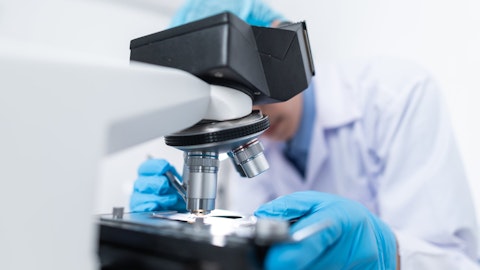Michael Shetzline: Yes, I can address that. Thanks for the opportunity to clarify. Just to be clear, too, as reported in clinicaltrials.gov, the trial is always planned to extend in 2024 — until 2024. What we’re trying to do is we’re trying to add clarity by acknowledging the opportunity to get data in the second half of ’23 that will inform us on the timing for the full study readout of the top line data. So in addition, our objective in any of the clinical programs is to use all the data we can to inform business decisions as early as possible. So in the second half of ’23, we expect to see the early data focused on T cell responses from enrolled patients. And based on the strong science around CNP-104, we really think that the T cell response is potentially a lead indicator for clinical responses.
And you mentioned specifically, alk phos. Alk phos is a liver biomarker, right? And again, it’s not — it is still a biomarker. And for products approved with alk phos, they often have to do post-marketing commitments to actually show that the alk phos provides a meaningful benefit to patients. We actually think the underlying pathology of PBC, driven by the PDC-E2 antigen, is more specifically addressed by looking at the autoreactive T cells. And so that’s what we focus — what we’re really trying to focus on in the second half of ’23. As I mentioned in the prepared remarks, we really expect to see early data on the T cell responses in the second half of 2023. And it will inform us on the timing. But at that point, we’ll give you an update on the status of the program.
Daniel Wolle: Okay. So just to clarify, is this an internal readout? Or will you be able to release that T cell response data to the Street?
Michael Shetzline: Yes. Again, we’re going to make an early assessment as a small group in a very controlled fashion just to make internal business decisions. When we see the data and we understand the relevance at that point, we’ll make a decision to update the program further and decide what to do.
Operator: Our next question will come from Tim Chiang with Capital One.
Timothy Chiang: Mike, I wanted to follow up on some of the comments on CNP-104. I think in prior discussions we’ve had, you’ve made the comment that, I guess, in preclinicals, there’s been, what, about a 90% reduction in T cell response that you’ve seen. Is that right? Or — I mean, obviously, there’s some preclinical data out there on CNP-104. And I wanted to ask you, what leads you to think that this should have a very, very positive reduction in T cell counts here?
Michael Shetzline: Yes. So that’s a good question. And there is preclinical data. There is a preclinical, there’s an animal model for PBC, which COUR has interrogated that does show that with the treatment with CNP-104, you get a reduction in those autoreactive T cells in an animal model. But the 90% number you referred to is a number you’ve heard me say in regards to the proof of technology study in celiac disease that was run by Takeda actually. That uses the COUR platform and the nano particles there encapsulate a gluten, and then it gets degraded to deamidated gliadin peptides. That’s the autoantigen in celiac. In celiac patients, and this is published in Gastro in June of 2021. The celiac patients, the 2 treatments over an 8-day period in celiac patients, saw a 90% reduction in the autoreactive T cells in celiac patients.




